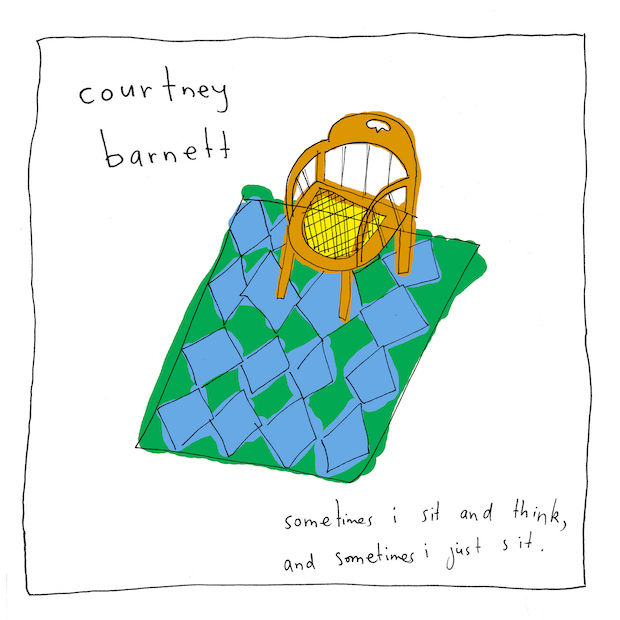Courtney Barnett sits, thinks and emotes on excellent debut LP
March 23, 2015
Courtney Barnett
Sometimes I Sit and Think, and Sometimes I Just Sit
Grade: A
No one asked “SNL”’s Dan Aykroyd to make Crystal Head Vodka. No one sat around wondering when singer-songwriter Nathan Williams from Wavves would start releasing instrumental hip-hop. No one picked up Toby Keith’s 1993 debut album and thought, “I can’t wait to visit this guy’s Bar & Grill.”
As a society, we’ve developed a nasty habit of encouraging the polymathic ambitions of people who should stick to one skill. We don’t have to worry about Courtney Barnett, though. She knows that people listen to her music for the lyrics, and, on her brilliantly titled debut album Sometimes I Sit and Think, and Sometimes I Just Sit, she meets those expectations.
It sounds backhanded and reductive, but I’m inclined to say that Barnett herself would agree. On record, she comes across as pathetic and self-effacing. One scan of the tracklist confirms this, with titles such as “Pedestrian at Best,” “Debbie Downer” and “Nobody Really Cares if You Don’t Go to the Party.” But she still embellishes her lyrics with prosaic details — the “Elevator Operator” of the album opener says, “I come up here for perception and clarity/ I like to imagine I’m playing SimCity.”
Ever since her breakthrough single “Avant Gardener,” this Australian singer-songwriter has fascinated the American underground with her ability to spin lyrical mastery out of a tedious existence.
Sometimes consistently delivers on that single’s promise whereas her 2013 double EP, A Sea of Split Peas, occasionally failed. Plus, it rewards honest listening as much as lyric-sheet scrutiny.
On Sometimes, Barnett only skirts with profundity when a heavy dose of sarcasm or apologia is involved — in “Small Poppies,” she admits “I used to hate myself, but now I think I’m all right.” It’s this tension between apathy and perceptiveness, between the loss of purpose and the accidental beauty of the quotidian that makes her music effective. By denying herself the right to be “deep” in any conventional sense, she captures the refreshingly anti-confessionalist meaning in often-overlooked banalities.
Barnett’s singing may not be virtuosic, but her devotion to diction and tone over pitch is smart. Her expressive guitar playing handsomely carries the melody, along with the tight (I mean, hermetically sealed) rhythm section of bassist Bones Sloane and drummer Dave Mudie.
But the band isn’t just there to whittle her witty ramblings into pop songs. Subtle flourishes throughout the album sympathize with the content of the lyrics.
For example, when Barnett’s voice glides carelessly up the line, “I’m sure it’s a bore being you“ in “Small Poppies,” her guitar responds by bending the note back down and the effect is not unlike a yawn. The strangled guitar leads on the chorus of “Pedestrian at Best” seem to scream on the behalf of a singer too self-defeating to break out of her own deadpan.
“Aqua Profunda!” uses the caffeinated peck of a piano in place of a cowbell, highlighting the frenetic energy of Barnett’s yarn about trying to impress a romantic prospect at a public pool. Her unwashed T-shirts and uninvolved fingernail strumming may project “slacker,” but the brainwave lockstep of music and lyrics on Sometimes says something else entirely: “auteur.”
There’s a point in the song “Depreston” during which the memory of a property’s deceased owners interrupts a home showing: “Then I see the handrail in the shower/ a collection of those canisters for coffee, tea and flour.” It’s here that a ghostly hum, half guitar and half organ, floats quietly across the stereo field. It dovetails into silence so imperceptibly that you wonder if it even happened.
Moments like this represent everything that makes Barnett a talented songwriter. She chooses deeply moving details from her own life for her songs, but she lets the tone of the music do the interpretation where her words might leave gaps. She lets the space between her observations seethe with pathos. The wit and emotions of her lyrics are each substantial in their own right, but they lock together so perfectly on this album that they make roadkill hilarious and water-stained ceilings horrifying without ever telling you why.
Barnett knows you’re listening for the lyrics, but she isn’t afraid to master every other facet of songwriting.



